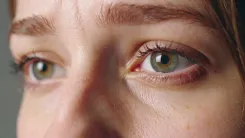Why Does Early Menopause Increase the Risk of Depression in Some Women?

Synopsis
Key Takeaways
- Severity of menopause symptoms can lead to depression.
- Lack of emotional support is a significant risk factor.
- Routine screening for depression is essential for women with POI.
- 29.9% of women with POI experience depressive symptoms.
- Hormone therapy is not a primary treatment for mood disorders.
New Delhi, July 16 (NationPress) The intensity of menopause symptoms and a deficiency in emotional support are likely contributors to why certain women face depression during early menopause, according to a study released on Wednesday.
Premature menopause, clinically referred to as premature or primary ovarian insufficiency (POI), describes a condition where the ovaries stop functioning properly before the age of 40. This condition is associated with a heightened lifetime risk of depression and anxiety.
Women affected by this condition not only suffer from the effects of oestrogen deficiency but also endure the unexpected loss of reproductive capabilities. However, the impact of these changes can vary significantly among individuals, with some women experiencing more severe depression and anxiety than others.
The study, which was published online in the journal Menopause, identified several risk factors, including younger age at diagnosis, the severity of menopause symptoms, lack of emotional support, and fertility-related grief.
“The significant occurrence of depressive symptoms among those with POI emphasizes the necessity for routine screening within this at-risk population,” stated Dr. Monica Christmas, associate medical director for The Menopause Society.
“Incorporating behavioral health interventions that are evidence-based should be a fundamental part of any comprehensive care strategy for POI,” Dr. Christmas added.
The analysis, which involved 345 women diagnosed with POI, revealed that the rate of depressive symptoms stood at 29.9%. Notably, no significant differences were noted in depressive symptoms between women undergoing oestrogen plus progestogen therapy and those who were not.
Furthermore, the administration of hormone therapy or the levels of oestradiol did not correlate with depressive symptoms.
“While hormone therapy is acknowledged as the standard treatment for managing some menopause-related symptoms and for preventive care in POI cases, it is not the primary option for addressing mood disorders,” Dr. Christmas explained.
“This was reflected in the findings that showed no disparity in depressive symptoms between those receiving hormone treatment and those who were not. Tackling behavioral health issues with evidence-based strategies should be an integral aspect of any comprehensive care plan for POI,” she concluded.









